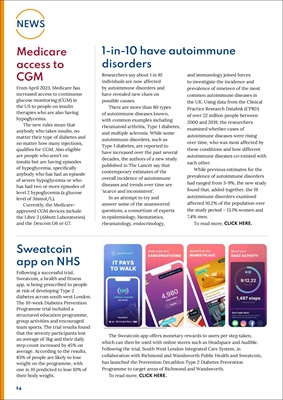
14
NEWS
Medicare
access to
CGM
From April 2023, Medicare has
increased access to continuous
glucose monitoring (CGM) in
the US to people on insulin
therapies who are also having
hypoglycemia.
The new rules mean that
anybody who takes insulin, no
matter their type of diabetes and
no matter how many injections,
qualifies for CGM. Also eligible
are people who aren't on
insulin but are having episodes
of hypoglycemia, specifically
anybody who has had an episode
of severe hypoglycemia or who
has had two or more episodes of
level 2 hypoglycemia (a glucose
level of 3mmol/L).
Currently, the Medicareapproved
CGM devices include
the Libre 2 (Abbott Laboratories)
and the Dexcom G6 or G7.
1-in-10 have autoimmune
disorders
Researchers say about 1 in 10
individuals are now affected
by autoimmune disorders and
have revealed new clues on
possible causes.
There are more than 80 types
of autoimmune diseases known,
with common examples including
rheumatoid arthritis, Type 1 diabetes,
and multiple sclerosis. While some
autoimmune disorders, such as
Type 1 diabetes, are reported to
have increased over the past several
decades, the authors of a new study
published in The Lancet say that
contemporary estimates of the
overall incidence of autoimmune
diseases and trends over time are
'scarce and inconsistent'.
In an attempt to try and
answer some of the unanswered
questions, a consortium of experts
in epidemiology, biostatistics,
rheumatology, endocrinology,
and immunology joined forces
to investigate the incidence and
prevalence of nineteen of the most
common autoimmune diseases in
the UK. Using data from the Clinical
Practice Research Datalink (CPRD)
of over 22 million people between
2000 and 2019, the researchers
examined whether cases of
autoimmune diseases were rising
over time, who was most affected by
these conditions and how different
autoimmune diseases co-existed with
each other.
While previous estimates for the
prevalence of autoimmune disorders
had ranged from 3-9%, the new study
found that, added together, the 19
autoimmune disorders examined
affected 10.2% of the population over
the study period - 13.1% women and
7.4% men.
To read more, CLICK HERE.
Sweatcoin
app on NHS
Following a successful trial,
Sweatcoin, a health and fitness
app, is being prescribed to people
at risk of developing Type 2
diabetes across south west London.
The 10-week Diabetes Prevention
Programme trial included a
structured education programme,
group activities and encouraged
team sports. The trial results found
that the seventy participants lost
an average of 3kg and their daily
step count increased by 45% on
average. According to the results,
85% of people are likely to lose
weight on the programme, with
one in 10 predicted to lose 10% of
their body weight.
The Sweatcoin app offers monetary rewards to users per step taken,
which can then be used with online stores such as Headspace and Audible.
Following the trial, South West London Integrated Care System, in
collaboration with Richmond and Wandsworth Public Health and Sweatcoin,
has launched the Prevention Decathlon Type 2 Diabetes Prevention
Programme to target areas of Richmond and Wandsworth.
To read more, CLICK HERE.